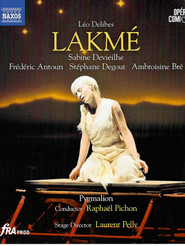detail profile mireille delunsch
Peran Yang Di Mainkan Mireille Delunsch
 Before the Trojan War Agamemnon gathered...
Before the Trojan War Agamemnon gathered...Gluck: Iphigenie en Aulide / Iphigenie en Tauride 2013
Before the Trojan War, Agamemnon gathered the Greek armies at the port of Aulis. The goddess Diane sent unfavorable winds to prevent the Greeks from sailing. Her oracle set a condition for Agamemnon: to earn the right to sail forth and destroy an innocent country, he would have to sacrifice his own daughter. Agamemnon accepted these terms and killed his young daughter Iphigénie on the altar. In his play Iphigenia in Tauris Euripides imagines that Diane plucked Iphigénie from that altar and delivered her to a temple in distant Tauride, where Iphigénie began to serve the enemy Scythians as Diane’s high priestess—all the while Iphigénie’s family believing her dead.
 Sophie left her homeland the United...
Sophie left her homeland the United...L'étrangère 2007
Sophie left her homeland, the United States, after a secret tragedy. In Paris, she divides her time between an opera house, where she is the dresser for a great Swedish singer, and amateur theater. David, her director, pushes her to her limits: she cannot refuse, so stubbornly, to live and love again. Little by little, Sophie lets herself be disturbed by her speech, and moved by the amorous games and the sensual atmosphere of the opera on which she is working, "Le Chevalier a la rose" by Richard Strauss. After each performance, Sophie sees a silent young man, Valentin. She is convinced that he is coming for the beautiful singer. But one day, he speaks to her, and Sophie finally becomes an actress of her own story.
 The prologue sets the stage for...
The prologue sets the stage for...Platée 2002
The prologue sets the stage for the action: Thespis, Momus and Thalie announce the subject of the play. It is a comedy mocking the folly of man...and the story of a trap set by Jupiter to cure Juno of her jealousy. The trap? It consists in convincing the water nymph Platée that Jupiter is in love with her. Mercury officially declares Jupiter’s love to Platée. When the god appears before her – first as a donkey, then an owl - the nymph calls on the birds of the marshes, but they scare Jupiter away. Luckily he quickly returns and declares his love for Platée. He even wants to marry her. La Folie comes to sing for the fiancée during an absolutely chaotic scene. However, as the couple prepares for the wedding, Juno arrives. Furious, she puts an end to the farce and ascends to the heavens with Jupiter. Humiliated, Platée understands she has been duped. She swims off into the marshes, as the chorus sings an ironic song in her honour.


 Performed at the Thtre Graslin in...
Performed at the Thtre Graslin in... Judith a young nurse is so...
Judith a young nurse is so... Late 19thcentury Paris home to Louise...
Late 19thcentury Paris home to Louise...